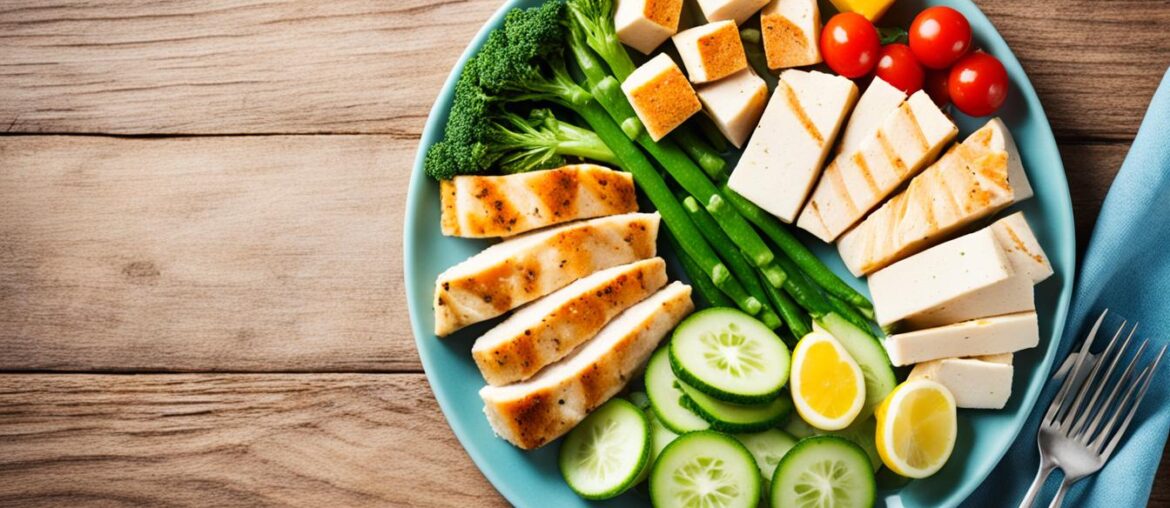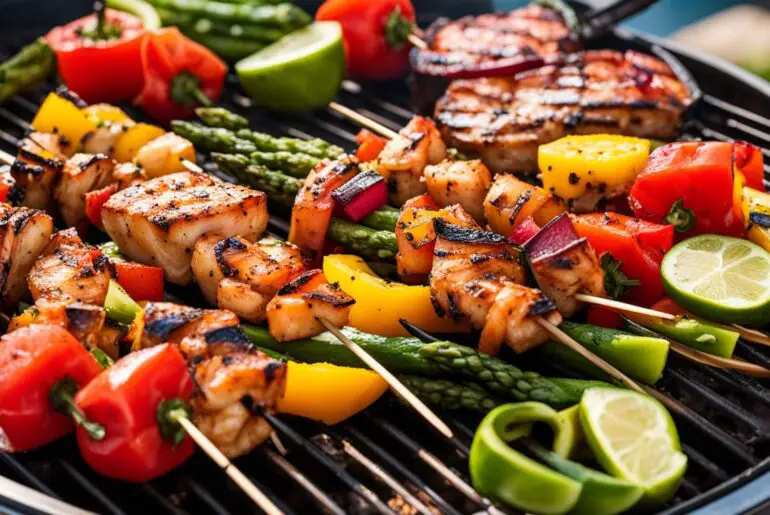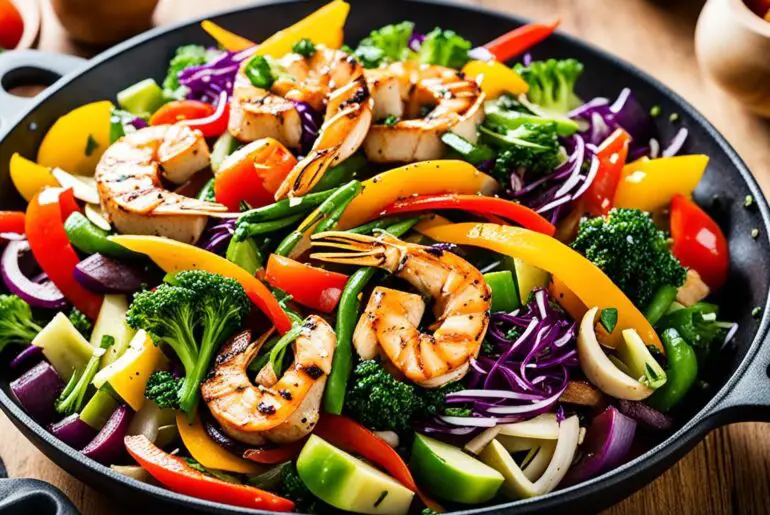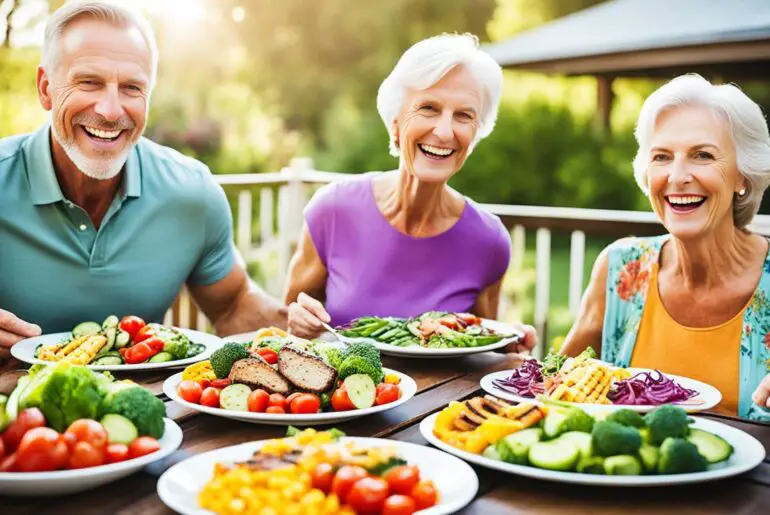Are you searching for an effective weight loss plan that incorporates high protein meals? Look no further than the HCG diet. But wait, is this controversial diet truly the key to successful weight loss? Is it safe and sustainable? Let’s explore the truth behind high protein HCG diet meals and uncover the facts.
Key Takeaways:
- The HCG diet is a weight loss plan that combines HCG hormone supplements or injections with a low-calorie diet.
- HCG supplements for weight loss are not approved by the FDA and are considered illegal.
- The weight loss achieved on the HCG diet is largely due to extreme calorie restriction rather than the HCG hormone itself.
- The HCG diet is not recognized as safe or effective by health experts.
- Consult with a healthcare professional before considering the HCG diet.
What is the HCG diet?
The HCG diet is a short-term eating plan that involves taking HCG hormone supplements or injections and significantly reducing calorie intake. This diet is divided into three phases and is designed to promote weight loss. Supporters of the HCG diet claim that it can result in rapid weight loss, with some even suggesting up to two pounds of weight loss per day.
However, it’s important to note that the HCG diet is highly controversial and not supported by health experts. There is a lack of scientific evidence to substantiate its effectiveness, and concerns have been raised regarding its safety.
The HCG diet plan requires individuals to consume low-calorie, high-protein meals. This combination is believed to support weight loss by restricting calorie intake while providing the essential nutrients found in protein-rich foods. By incorporating lean protein sources such as chicken, fish, and beef, the HCG diet aims to help individuals feel satiated while losing weight.
Key Components of the HCG Diet:
- Taking HCG hormone supplements or injections
- Significantly reducing calorie intake
- Consuming low-calorie, high-protein meals
The HCG diet is a popular choice for individuals looking to shed excess pounds quickly. However, it is crucial to approach this diet with caution and consult with a healthcare professional before embarking on it.
Health experts warn against the HCG diet due to several reasons. Firstly, the extreme calorie restriction may lead to nutrient deficiencies and potential health risks. Secondly, the use of HCG hormone supplements or injections for weight loss is not approved by the FDA and is considered illegal.
While the HCG diet may seem appealing due to the promise of rapid weight loss, it is essential to prioritize overall health and well-being. It is recommended to explore alternative weight loss strategies that are supported by scientific evidence and promote a balanced approach to nutrition and physical activity.
HCG Diet Meal Plan
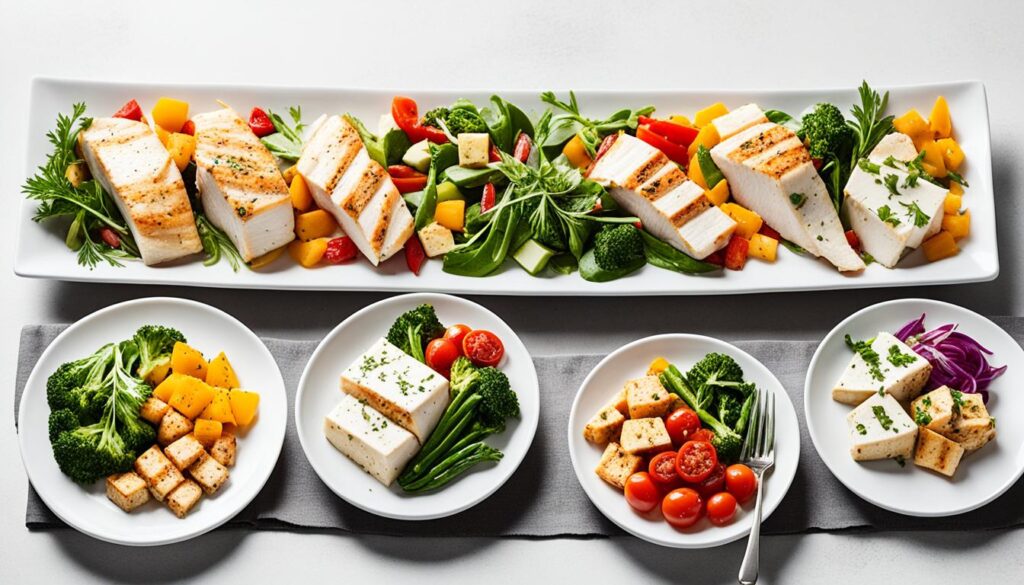
The HCG diet meal plan is a highly restrictive and low-calorie eating regimen designed for rapid weight loss. It consists of two meals per day, each carefully crafted to provide essential nutrition while keeping calorie intake to a minimum.
During the weight loss phase of the HCG diet, the total calorie intake typically ranges from 500 to 800 calories per day. These meals are centered around lean protein options such as chicken, fish, and beef, which provide the necessary amino acids for muscle maintenance and repair.
Accompanying the protein sources are a limited selection of vegetables and fruits that add flavor, fiber, and essential vitamins and minerals to the meals. Some approved vegetables include spinach, lettuce, celery, tomatoes, and onions, while fruits like apples, oranges, and strawberries are also permitted.
Meal preparation on the HCG diet can be quick and easy, focusing on steaming or grilling the protein sources and adding herbs and spices for flavor. By carefully selecting the right ingredients and following portion guidelines, nutritious and satisfying meals can be created.
It is essential to note that the HCG diet meal plan should only be followed under medical supervision. The extreme calorie restriction and limited food options can lead to nutrient deficiencies and other health risks if not properly managed.
Sample HCG Diet Meal Plan
| Meal | Protein Source | Vegetables | Fruits |
|---|---|---|---|
| Lunch | Grilled Chicken Breast | Spinach and Lettuce Salad | Apple |
| Dinner | Grilled Fish | Steamed Broccoli | Orange |
Approved Foods on the HCG Diet
https://www.youtube.com/watch?v=mJzl6NheRYk
When following the HCG diet during the weight loss phase, it is crucial to know the approved foods that can be included in your meals. This section outlines the protein sources, vegetables, and fruits that can be enjoyed while on the HCG diet.
Approved protein sources on the HCG diet:
- Chicken
- Fish
- Shrimp
- Beef
- Veal
These protein options are lean and provide essential nutrients while keeping the calorie intake low. Incorporating them into your meals can help ensure a balanced and satisfying diet.
Approved vegetables on the HCG diet:
- Spinach
- Lettuce
- Celery
- Tomatoes
- Onions
These vegetables are rich in vitamins, minerals, and fiber, providing essential nutrients to support your health during the weight loss phase of the HCG diet.
Approved fruits on the HCG diet:
- Apples
- Oranges
- Strawberries
These fruits offer a natural sweetness and can be enjoyed as a healthy snack or incorporated into your meals to add flavor and variety.
It is important to note that the HCG diet restricts high-carb foods, sweets, and desserts to promote weight loss. By focusing on these approved foods, you can create protein-rich HCG diet meals that are nutritious and satisfying.
Sample Protein-Rich HCG Diet Meal
“I love creating protein-rich meals on the HCG diet. One of my favorite recipes is grilled chicken breast served with a side of steamed spinach and cherry tomatoes. The chicken is seasoned with garlic, paprika, and a squeeze of lemon juice for extra flavor. It’s a delicious and satisfying meal that keeps me on track with my weight loss goals.”
Meal Preparation and Recipes on the HCG Diet
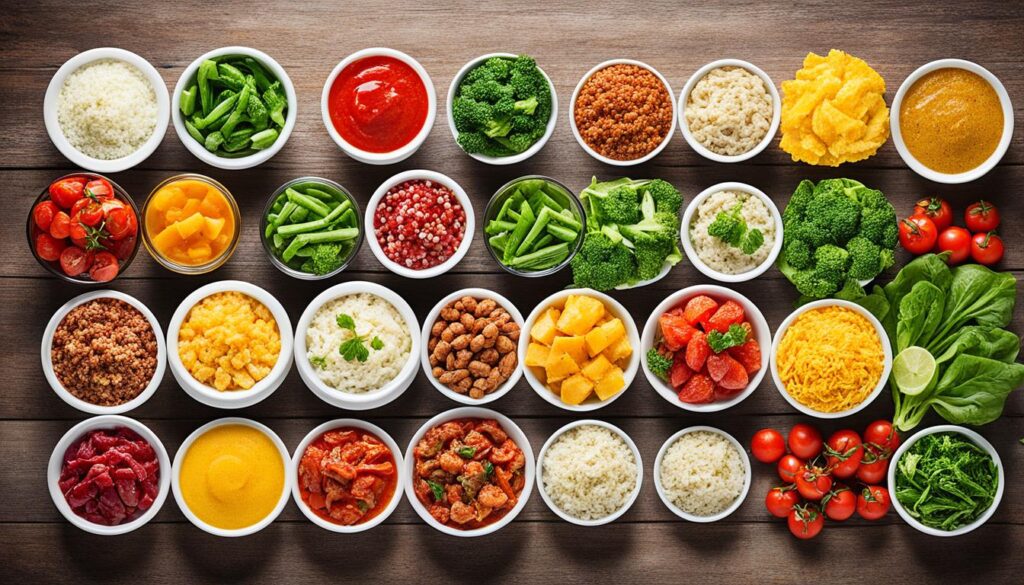
While following the HCG diet, you have the flexibility to create your own meals using approved ingredients. By incorporating flavorful herbs, spices, and seasonings, you can make protein-rich HCG diet meals that are delicious and satisfying. Here are a couple of meal preparation ideas to inspire your culinary creativity:
1. Chicken Salad with Diced Apple and Celery
This refreshing salad combines lean protein from grilled chicken with the crispness of diced apple and celery. The addition of tangy lemon juice and a hint of warm spices like cinnamon and nutmeg adds a burst of flavor.
2. Roasted White Fish with Cucumber Garlic Pickles
For a light and tasty meal, try roasted white fish served with homemade cucumber garlic pickles. The natural tang of cucumber, combined with the zing of garlic and a splash of vinegar and lemon juice, perfectly complements the delicate flavor of the fish.
Remember to play around with different combinations of approved proteins, vegetables, and fruits to create a variety of protein-rich, low-calorie meals on the HCG diet.
Disclaimer: Before starting any weight loss or dietary program, consult with a healthcare professional or a registered dietitian to ensure it is safe and suitable for your individual needs.
**Table: Protein-Rich HCG Diet Meal Ideas**
| **Meal Ideas** | **Description** |
|——————————————-|——————————————————————————|
| Grilled Chicken with Steamed Broccoli | A classic HCG diet meal, pairing grilled chicken breast with steamed broccoli. |
| Baked Fish with Lemon and Asparagus | Light and flavorful, this option features baked fish seasoned with lemon zest and served with roasted asparagus. |
| Beef Stir-Fry with Mixed Vegetables | Satisfying and packed with nutrients, this stir-fry combines lean beef strips with colorful mixed vegetables and a splash of low-sodium soy sauce. |
“Meal preparation is key to staying on track with the HCG diet. By planning and creating protein-rich meals that are both nutritious and satisfying, you can increase your chances of success.”
Be sure to keep these recipes and meal ideas handy throughout your HCG diet journey. Remember, maintaining a healthy diet is about making smart choices and finding joy in the process.
Phases of the HCG Diet
The HCG diet follows a structured protocol consisting of four phases: pre-diet cleanse, phase one, phase two, and phase three. Each phase serves a specific purpose in the overall weight loss journey.
1. Pre-Diet Cleanse:
This phase is optional but recommended as it helps prepare the body for the subsequent phases. During the pre-diet cleanse, individuals focus on removing toxins by consuming organic fruits and vegetables while avoiding processed foods, caffeine, and alcohol.
2. Phase One:
In phase one, the goal is to interfere with fat storage by consuming high-fat foods. This phase typically lasts for two days and is accompanied by HCG hormone injections. The high-fat intake helps kickstart the body’s metabolism and prepares it for the calorie restriction in the next phase.
3. Phase Two:
Phase two is the main weight loss phase of the HCG diet. It involves a low-calorie diet, typically ranging from 500 to 800 calories per day, along with continued HCG injections. The calorie restriction combined with the HCG hormone is believed to promote fat burning and weight loss. Phase two typically lasts for several weeks, depending on individual goals.
4. Phase Three:
Phase three focuses on weight maintenance. After completing the low-calorie phase, individuals gradually increase their caloric intake while eliminating HCG injections. The goal is to stabilize weight and establish healthier eating habits. This phase also allows for reintroducing a wider variety of foods while still maintaining portion control.
In conclusion, the HCG diet follows a sequential approach with different phases, each serving a specific purpose. While the effectiveness and safety of the diet remain debatable, individuals considering the HCG diet should consult with a healthcare professional to ensure suitability and proper guidance throughout the process.
Safety and Concerns of the HCG Diet
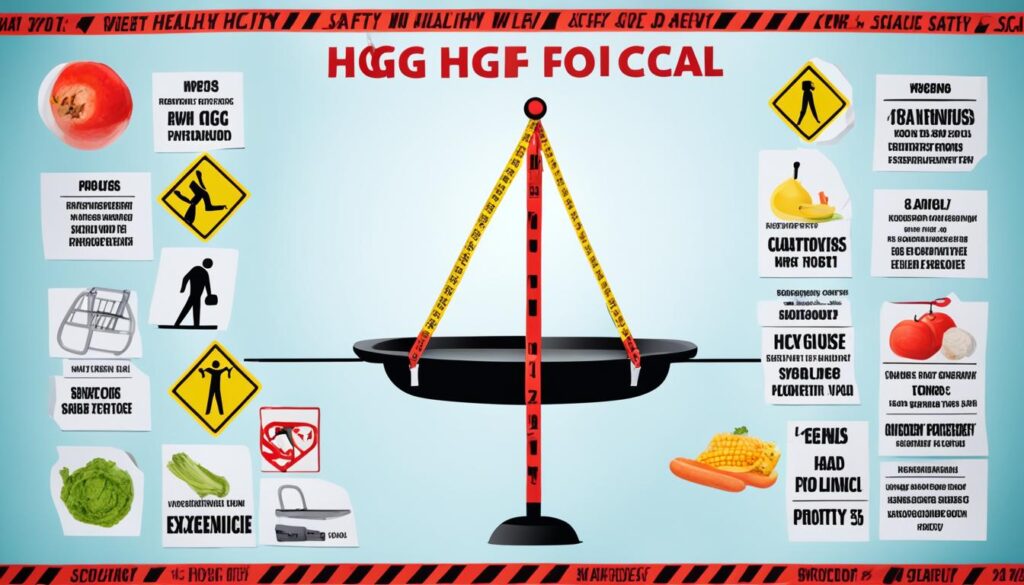
The HCG diet is associated with several safety concerns and is considered highly unsafe and unhealthy. Additionally, the use of HCG products for weight loss is illegal, as these products are not approved by the FDA for such purposes.
The extreme calorie restriction required by the HCG diet can lead to various side effects and health risks. Individuals following the diet may experience persistent hunger, frequent headaches, and fatigue due to the severe calorie deficit.
Furthermore, the HCG diet may result in nutrient deficiencies as it restricts the intake of many essential nutrients. This deficiency can lead to problems such as weakness, muscle cramps, and impaired immune function.
It is crucial to consult with a healthcare professional before considering the HCG diet. They can provide guidance, assess your individual health status, and help you make informed decisions about your weight loss journey.
“The extreme calorie restriction and potential side effects associated with the HCG diet raise concerns about its safety and effectiveness.” – Dr. Jessica Ramirez, Registered Dietitian
Choosing a safer and more sustainable weight loss approach that focuses on balanced nutrition and regular physical activity is highly recommended.
Illegal HCG Products
It is important to note that over-the-counter HCG products marketed for weight loss are illegal. The FDA has only approved the use of prescription HCG for the treatment of female infertility.
These illegally marketed HCG products can pose significant risks to consumers’ health. The safety and quality of these products are not regulated, and their effectiveness in promoting weight loss is unsupported by scientific evidence.
It is crucial to protect yourself by avoiding the use of illegal HCG products sold online or through untrustworthy sources. Instead, consult with a healthcare professional who can guide you toward safe and evidence-based weight loss strategies.
Maintaining Weight After the HCG Diet
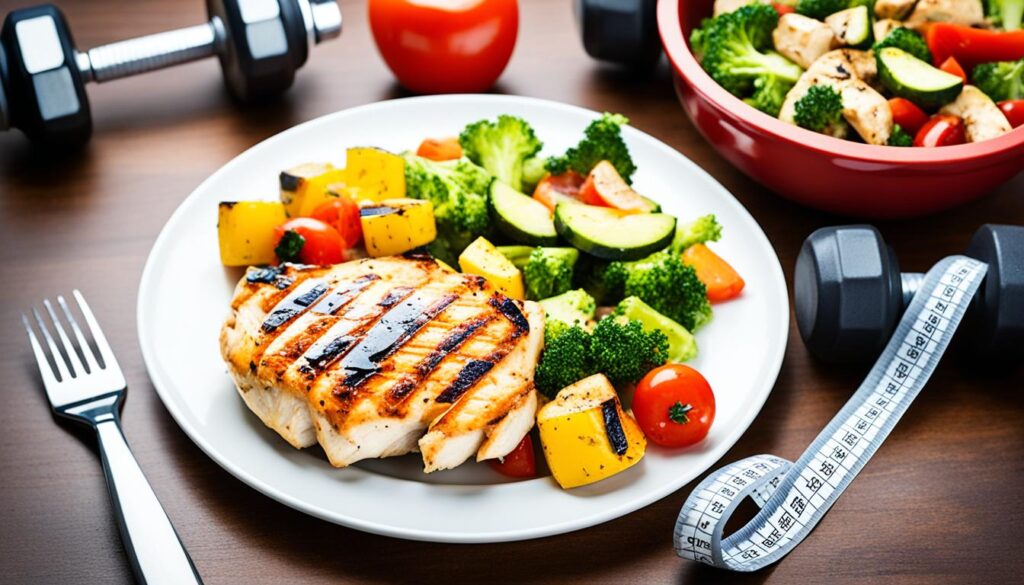
After completing the HCG diet, it is essential to focus on long-term weight management. This involves establishing healthy eating habits, regular physical activity, and balanced nutrition. Caloric intake should be appropriate for weight maintenance, typically ranging from 1,500 to 2,500 calories per day. It is recommended to prioritize whole, unprocessed foods and avoid excessive intake of starches, sugars, and fats.
The Key Principles of Healthy Weight Management
- Establishing a Balanced Diet: Incorporate a variety of nutrient-dense foods into your daily meals. Include lean proteins, whole grains, fruits, vegetables, and healthy fats.
- Portion Control: Pay attention to portion sizes and listen to your body’s hunger and fullness cues.
- Regular Physical Activity: Engage in at least 150 minutes of moderate-intensity aerobic activity per week, along with strength training exercises for major muscle groups.
- Hydration: Drink an adequate amount of water throughout the day to support overall health and weight management.
- Sleep Quality: Prioritize sufficient sleep to support optimal metabolism and overall well-being.
To further support your weight management journey, consider seeking guidance from a registered dietitian or nutritionist who can create a personalized plan tailored to your specific needs and goals. Remember that maintaining a healthy weight is a lifelong commitment and requires ongoing efforts.
When it comes to maintaining weight after the HCG diet, it’s all about finding a balance between nourishing your body and enjoying food in a sustainable and mindful way. – Dr. Sarah Johnson
Sample Meal Plan for Weight Maintenance
| Meal | Food | Portion Size |
|---|---|---|
| Breakfast | Scrambled eggs | 2 eggs |
| Whole grain toast | 1 slice | |
| Fresh fruit | 1 cup | |
| Lunch | Grilled chicken breast | 4 oz |
| Quinoa | 1/2 cup | |
| Steamed vegetables | 1 cup | |
| Dinner | Salmon | 4 oz |
| Brown rice | 1/2 cup | |
| Roasted Brussels sprouts | 1 cup |
Remember to customize your meal plan based on your individual calorie needs and dietary preferences. Stick to whole foods, limit processed foods, and incorporate regular exercise into your routine for optimal weight maintenance.
After completing the HCG diet, it is crucial to prioritize healthy weight management to maintain the progress you have achieved. By adopting a balanced approach to nutrition, staying active, and making sustainable lifestyle choices, you can continue to enjoy the benefits of a healthier weight in the long run.
Conclusion
After carefully evaluating the HCG diet, it is clear that this weight loss plan is not recommended. Health experts do not recognize it as safe or effective, and the use of HCG products for weight loss is illegal. The extreme calorie restriction involved in the diet can lead to various health risks and nutrient deficiencies.
It is crucial to prioritize overall health and well-being when considering weight loss options. Instead of embarking on the HCG diet, it is advisable to explore alternative and safer approaches. These may include incorporating regular physical activity, adopting a balanced and nutritious diet, and seeking guidance from healthcare professionals or registered dietitians.
Remember, sustainable weight loss is a journey that requires a long-term commitment to healthy eating habits and proper lifestyle choices. By focusing on gradual and sustainable changes, you can achieve your weight loss goals while also improving your overall health and well-being.
FAQ
What is the HCG diet?
The HCG diet is a weight loss plan that combines HCG hormone supplements or injections with a low-calorie diet. However, it is important to note that HCG supplements for weight loss are not approved by the FDA and are considered illegal. The weight loss achieved on the HCG diet is largely due to extreme calorie restriction rather than the HCG hormone itself. It is not recognized as safe or effective by health experts.
What does the HCG diet meal plan consist of?
The HCG diet meal plan is highly restrictive and low in calories. It typically includes two meals per day, consisting of lean protein options such as chicken, fish, and beef, along with a limited selection of vegetables and fruits. The total calorie intake is usually around 500 to 800 calories per day during the weight loss phase. It is important to note that such low-calorie diets should only be followed under medical supervision.
What foods are approved on the HCG diet?
The HCG diet allows for specific foods during the weight loss phase. Approved protein sources include chicken, fish, shrimp, beef, and veal, while approved vegetables include spinach, lettuce, celery, tomatoes, and onions. Fruits like apples, oranges, and strawberries are also permitted. The diet emphasizes lean protein and restricts high-carb foods, sweets, and desserts.
Are there specific recipes for the HCG diet?
While there are no specific recipes required on the HCG diet, meal preparation options are available. For example, one could prepare a chicken salad with diced apple and celery, seasoned with lemon juice and spices like cinnamon and nutmeg. Another option could be roasted white fish with pickles made from cucumber, garlic, vinegar, and lemon juice. It is essential to focus on flavoring meals with herbs, spices, and seasonings to enhance taste.
What are the phases of the HCG diet?
The HCG diet consists of four phases: pre-diet cleanse, phase one, phase two, and phase three. The pre-diet cleanse is optional but can help prepare the body for the subsequent phases. Phase one involves high-fat intake and HCG injections to interfere with fat storage. Phase two is the main weight loss phase, with calorie restriction and continued HCG injections. Phase three focuses on weight maintenance, and phase four involves long-term weight management.
Is the HCG diet safe?
The HCG diet is considered highly unsafe, unhealthy, and illegal. The FDA has only approved HCG prescriptions for the treatment of female infertility, and over-the-counter HCG products for weight loss are prohibited. The extreme calorie restriction of the diet can lead to various side effects such as hunger, headaches, fatigue, and nutrient deficiencies. It is crucial to consult with a healthcare professional before considering the HCG diet.
How can I maintain my weight after completing the HCG diet?
After completing the HCG diet, it is essential to focus on long-term weight management. This involves establishing healthy eating habits, regular physical activity, and balanced nutrition. Caloric intake should be appropriate for weight maintenance, typically ranging from 1,500 to 2,500 calories per day. It is recommended to prioritize whole, unprocessed foods and avoid excessive intake of starches, sugars, and fats.

